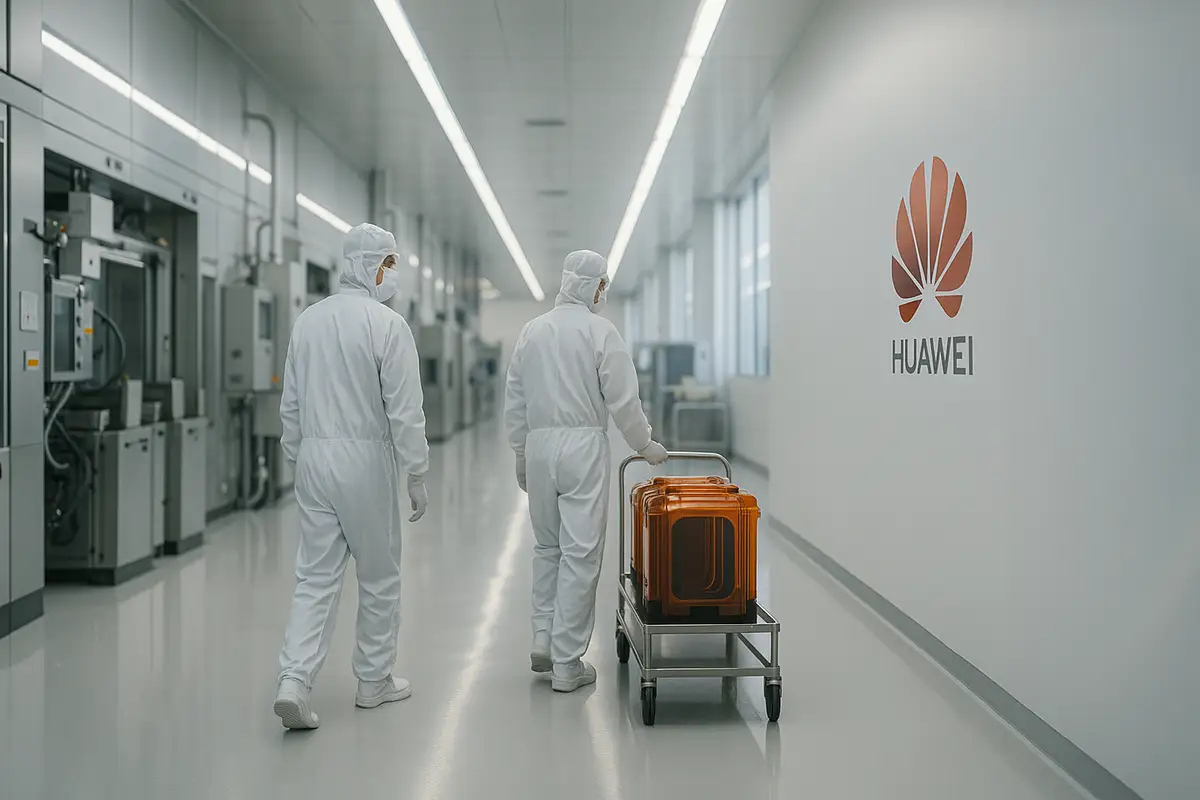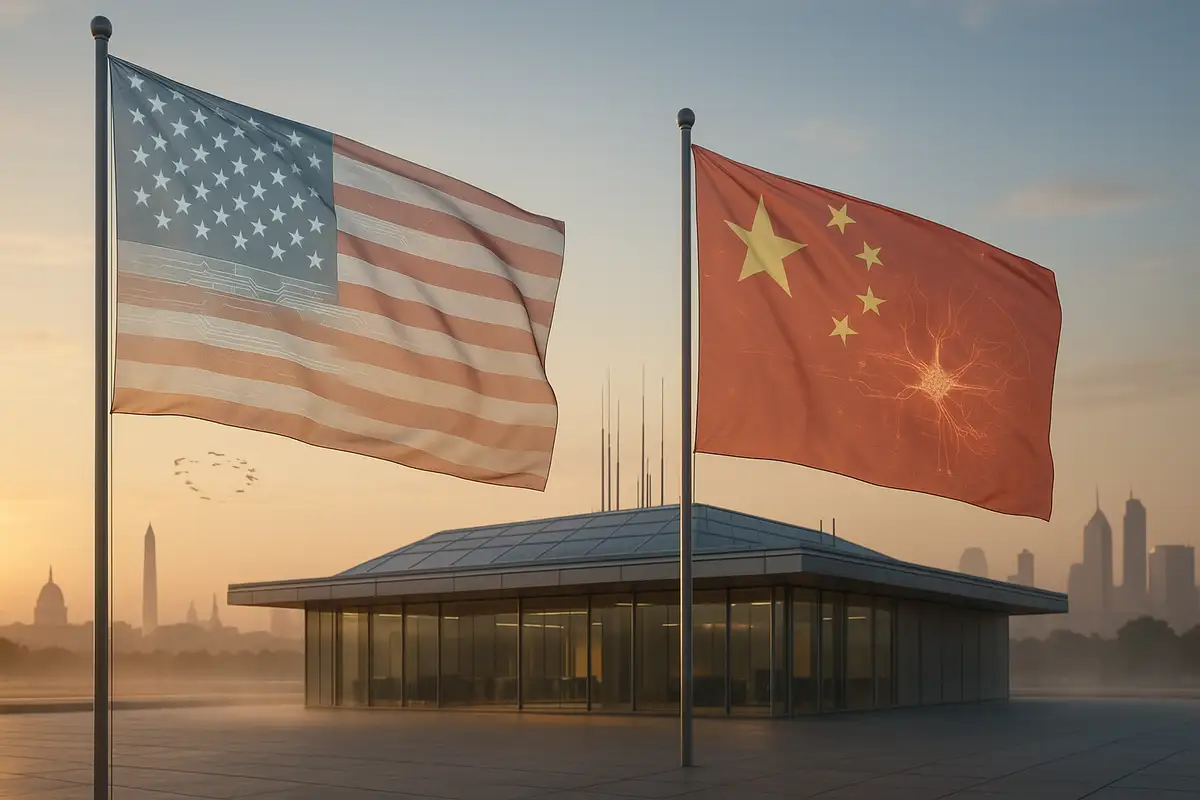💡 TL;DR - The 30 Seconds Version
👉 Chinese tech stocks surge 4.2% to highest levels since 2021, with Baidu leading at 16% gain after analysts highlight AI model potential.
📊 Chinese tech giants plan $32 billion AI spending in 2025, more than doubling their $13 billion outlay from 2023.
💰 Smart financing through yuan bonds saves companies 200 basis points versus dollar debt, with Tencent raising 9 billion yuan at just 2.1% interest.
🤖 DeepSeek's breakthrough changed the game by proving competitive AI models can be built at fraction of assumed costs.
🌍 Companies are timing expansion during improving US-China relations, with Trump-Xi call scheduled and TikTok framework in place.
🚀 Chinese firms pursue cost-efficient scaling versus US rivals' capital intensity, potentially reshaping global AI competition dynamics.
Bond spree funds $32 billion spending race. DeepSeek shadow reshapes competition dynamics
Chinese tech stocks just had their best day since 2021, and this time there's real substance behind the move. The Hang Seng Tech Index jumped 4.2% Wednesday to hit levels not seen since November 2021, with Baidu leading the charge up 16% after analysts started getting serious about its AI model potentially challenging DeepSeek.
We're looking at seven straight weeks of gains now, pushing the index up 42% this year. But here's what makes this rally different from the usual regulatory relief plays or stimulus hopes—Chinese tech companies are in the middle of what might be the biggest spending spree in their history.
The scale is pretty remarkable. These companies are planning to drop $32 billion on AI infrastructure next year alone, more than double their 2023 spending. And they're funding it through some smart financial engineering—over $5 billion raised just in September through yuan-denominated bonds that cost them way less than dollar alternatives.
The financing makes all the difference
The math here is compelling. Tencent just returned to bond markets for the first time in four years, raising 9 billion yuan at 2.1% interest. That's about 150 basis points cheaper than what they'd pay for comparable US Treasury yields. Alibaba pulled off the year's largest convertible bond offering at $3.2 billion, getting expansion capital without immediately diluting shares.
When you break it down, Chinese companies save roughly 200 basis points issuing yuan debt versus dollar bonds—we're talking 4-5% for three-year dollar bonds compared to around 2% for yuan debt. Those savings add up fast when you're planning tens of billions in spending.
Beijing's perspective here is straightforward: keep the capital domestic, reduce dollar exposure, fund AI development without foreign currency risk. The timing isn't coincidental either—it lines up perfectly with DeepSeek proving you don't need Silicon Valley-level capital intensity to build competitive AI.
DeepSeek changed the entire calculation
When DeepSeek dropped its breakthrough model in January, it fundamentally shifted how people think about AI development costs. This Chinese startup showed you could train sophisticated language models for a fraction of what everyone assumed was necessary. That changes everything about investment strategy.
Chinese companies are now doing what analysts call "efficient scaling"—massive AI investments by their standards, but with the kind of cost discipline that US competitors seem to have thrown out the window. Alibaba's committing 380 billion yuan over three years for AI infrastructure, which sounds enormous until you realize individual US hyperscalers spend more than that annually.
Markets are responding accordingly. Baidu's 16% pop came after analysts said its AI model shows "potential to surpass DeepSeek." Goldman Sachs bumped up Alibaba targets based on cloud business outlook. The signal is clear: investors think Chinese AI development can achieve competitive performance without trying to match US spending levels dollar-for-dollar.
Playing the geopolitical timing
There's definitely a geopolitical window being exploited here. This funding surge comes right as US-China tech relations show signs of temporary improvement. Trump's got a call scheduled with Xi Jinping on Friday, there's the TikTok framework agreement—it suggests Chinese companies see a narrow opportunity to build domestic capabilities before restrictions potentially tighten again.
China Unicom's deployment of AI chips from Alibaba's T-Head unit got highlighted during Premier Li Qiang's recent visit to Qinghai province. That's concrete progress toward technology independence. SMIC's reported trials on domestically-produced chipmaking equipment point the same direction. These aren't pilot projects—they're building blocks for longer-term self-reliance.
Investors seem to be pricing in both the capability development and the valuation opportunity. Chinese tech stocks trade at 21 times forward earnings versus the Nasdaq 100's 27 times, despite comparable growth rates and expanding AI monetization. UBS analysts call it "resilience reinforcing confidence in AI leaders with scalable infrastructure."
A completely different playbook
Here's what's really interesting—this rally feels nothing like previous Chinese tech surges driven by regulatory relief hopes or stimulus expectations. This cycle is about actual AI monetization capability. Companies are proving they can translate investments into revenue growth faster than many Western observers expected.
Chinese tech firms appear to have cracked the code on competing simultaneously on two fronts: technological advancement and geopolitical navigation. Instead of trying to outspend US rivals head-to-head, they're developing cost-efficient approaches that could prove more sustainable long-term.
Success depends on a few key factors, obviously. Continued access to advanced semiconductors tops the list. But also their ability to actually commercialize AI applications in the world's second-largest economy. Early indicators suggest progress on both fronts, though semiconductors remain the biggest question mark.
The bond market activity suggests these companies are thinking strategically rather than just riding momentum. They're locking in cheap funding while conditions allow, building infrastructure for sustained competition rather than short-term gains. That's probably the most encouraging signal of all.
Why this matters:
• Chinese companies are demonstrating that AI leadership may not require matching US capital intensity, potentially reshaping global tech competition through efficiency rather than pure scale
• Strategic debt financing enables massive expansion while maintaining flexibility, indicating these firms are positioning for extended competition rather than quick tactical wins
❓ Frequently Asked Questions
Q: Why are yuan bonds so much cheaper for Chinese companies than dollar bonds?
A: Chinese companies save about 200 basis points by issuing yuan debt versus dollar bonds—paying around 2% for yuan bonds compared to 4-5% for dollar bonds. This happens because of lower Chinese interest rates and the China-US yield spread, making domestic financing significantly more attractive.
Q: How does China's $32 billion AI spending compare to what US companies are spending?
A: US spending dwarfs Chinese investment. The six largest US hyperscalers—Meta, Microsoft, Amazon, Alphabet, Oracle, and Apple—are projected to spend over $390 billion on technology this year alone, more than 12 times China's planned $32 billion for 2025.
Q: What is DeepSeek and why did it change everything for Chinese AI?
A: DeepSeek is a Chinese AI startup that demonstrated in January how to train sophisticated language models at a fraction of assumed costs. Their breakthrough proved competitive AI could be built without Silicon Valley-level capital intensity, fundamentally shifting how Chinese companies approach AI development.
Q: Are Chinese tech stocks still cheaper than US tech stocks?
A: Yes, significantly. Chinese tech stocks trade at 21 times forward earnings versus the Nasdaq 100's 27 times, despite comparable revenue growth rates and expanding AI capabilities. This valuation gap partly explains current investor interest in Chinese tech names.
Q: What specific AI capabilities are these Chinese companies actually building?
A: Companies are developing large language models (Tencent's Hunyuan, Baidu's Ernie), autonomous driving systems, in-house AI chips, and cloud AI services. Alibaba is pursuing artificial general intelligence, while others focus on AI-enhanced advertising, gaming, and content creation for their existing businesses.















